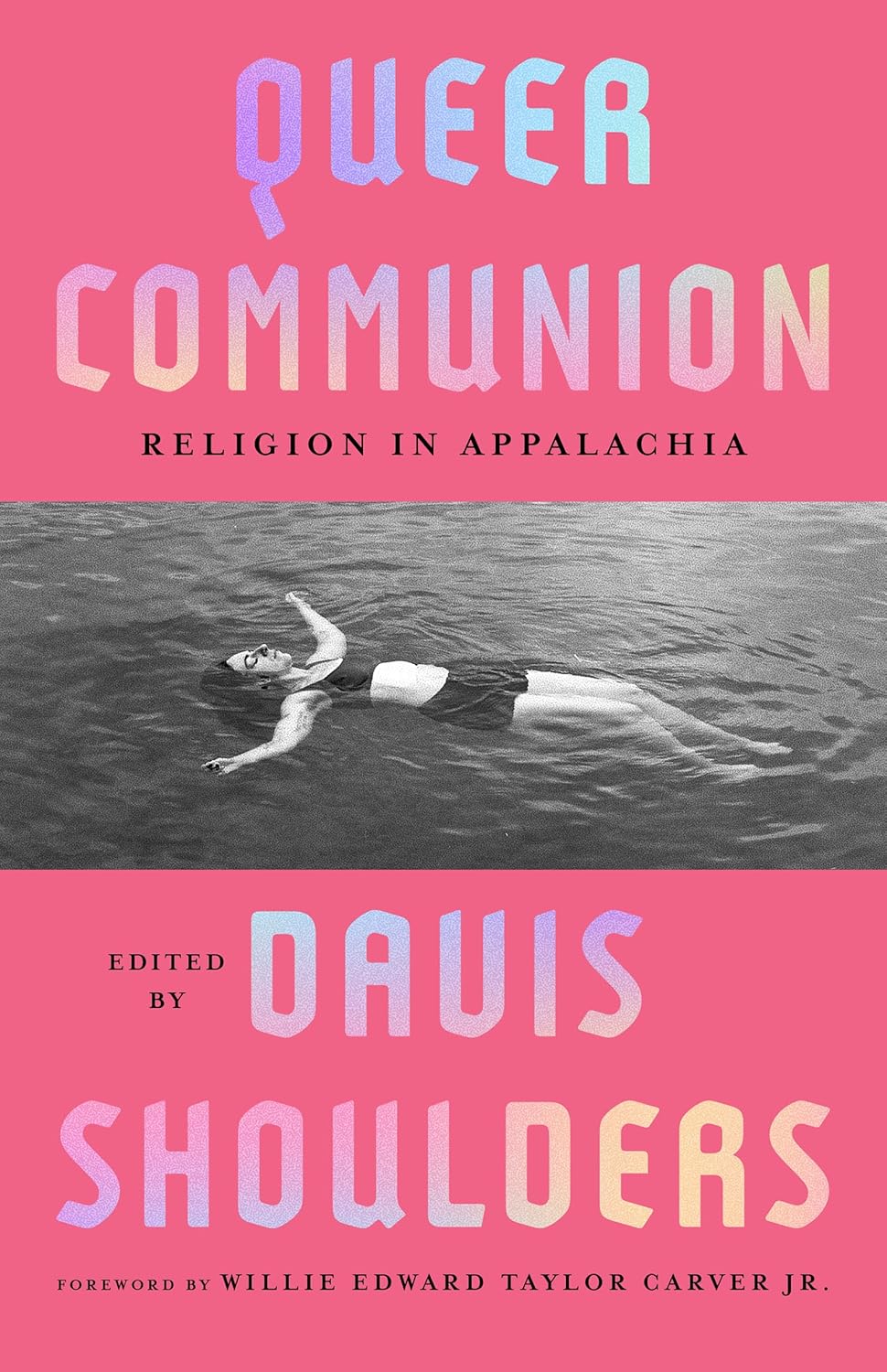Review of Queer Communion: Religion in Appalachia edited by Davis Shoulders

Queer Communion: Religion in Appalachia
Edited by Davis Shoulders
University Press of Kentucky, 2025, 168 pages
$19.95
Reviewed by Allison Quinlan
“If the concept of God has any validity or any use, it can only be to make us larger, freer, and more loving. If God cannot do this, then it is time we got rid of Him” (James Baldwin, 1962).
From the start, this collection makes clear a shared experience of being harmed by the people we love the most, in the name of God and love, and the complications that arise when you continue to love the people who seem to swing between loving you and hating you. Each work in the compilation wrestles with what it means to have faith, both in God and the people around us, beginning with, “effectively all rural queer Appalachians and Southerners have loved people who hated them—or at least parts of them, parts that can’t be divided out” (x). While Queer Communion leans more into a positive connection with faith, it doesn’t shy away from harm either; it just shows ways in which people have re-shaped or found a different way of worship, which I appreciated.
The collection reiterates the idea of making one’s religion in nearly every segment, piecing together queerness with Appalachian identity, religious views (from Catholicism to strict protestant evangelicalism), and how this “holiness” exists apart from exclusionary beliefs. Davis Shoulders writes, “I attend a church of my own making. At any place where a sense of knowing is felt” (128). And Jarred Johnson says, “Faith seems like it should be life-transforming, not a set of strictures by which to abide” (118). Savannah Sipple defines love and holiness well, writing:
There are moments in our lives when we know we’re confident in the person we are, in the things we know to be true about ourselves. . . What would my grandmother say about this granddaughter of hers who now has a wife, who now has a love whose arms open wide enough to call me home? I’d like to think she’d call that holy (13).
I agree that faith is about finding a place of honesty, where one can be fully themselves. Julie Rae Powers calls queerness “spiritual in its own right” (21). The theme of queer acceptance is constant in the collection; for example, John Golden’s piece begins by discussing baptism as a moment of queer acceptance, which I appreciated for its beautiful symbolism.
Golden’s work took an interesting turn, though, when they told a story about arguing with a right-wing man, and in a moment of anger, told him he’s removed from the grace of God. Later, they expressed regret, and I was a bit conflicted. Hateful people tell queer folks all the time that God condemns them. Why should this hateful guy get mercy? I suppose it’s complicated. Golden’s piece forces you to sit with the question of whether anyone gets to say who’s beyond redemption.
Conflict is part of what makes the collection so wonderful, though, because it’s honest and, in many cases, doesn’t tie everything up neatly. It recognises the pain of religion, deep and complicated that it is. Some of the essays lean into faith and find peace in it, while others walk away from it entirely. The collection makes space for both. Mack Rogers’ piece offers insight into how a faith that emphasises control and worship, conditional love, and operates as a tool for manipulation can impact us. Then, it compares this religious control with defining one’s own joy. Emma Cieslik sums up the conflict well, writing, “many queer people like myself feel the same urgency of ‘choice’ or being pushed to ‘decide’ between living as their authentic selves and drinking the Kool-Aid of the church” (45).
I finished the work with the takeaway that each author had built something sacred for themselves, even in spaces where they were told they didn’t belong. Shoulders describes the struggle of situating Appalachian identity given others’ exclusionary beliefs, saying, “They’ve imagined it to be a place where a person like me shouldn’t belong” (132). And yet every author has dispelled aspects of those imaginings. Appalachia is and always has been a space where everyone belongs; the people who hate don’t get to define God, the land, and who is welcome, no matter how hard they might try.
Allison Quinlan is a nonprofit manager in Scotland, originally from the rural southern United States.
"Empowerment comes from ideas."
― Charlene Carruthers
"Your silence will not protect you."
— Tourmaline
"Gender is the poetry each of us makes out of the language we are taught."
— Leila Raven


